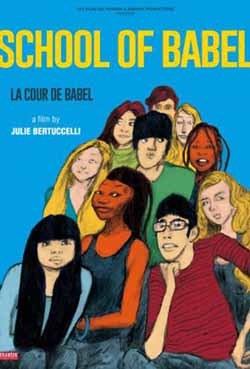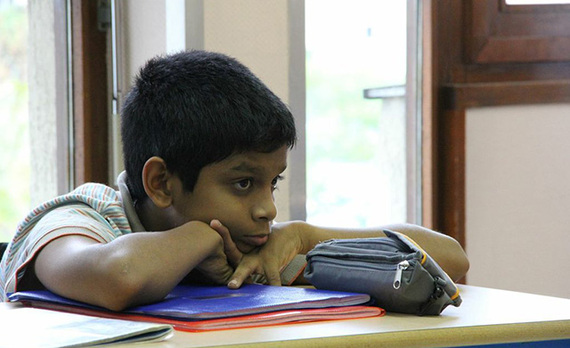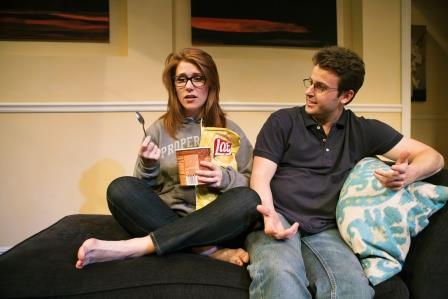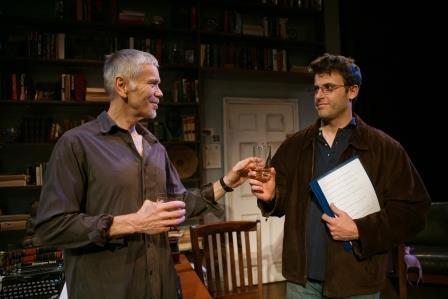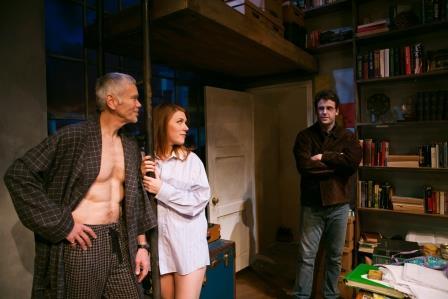
If there's one part of my education in which I consider myself to have been extremely fortunate, it's the fact that I've had some wonderful teachers and professors -- inspired educators who could ignite a student's curiosity and encourage him to always pursue the answers to his questions. As a result of having grown up in a family of teachers and librarians, certain entertainment choices are almost a given.
- If a musical or drama takes place in an educational setting (The History Boys, The 25th Annual Putnam County Spelling Bee, Gidion's Knot, The Prime of Miss Jean Brodie, The Education of H*y*m*a*n K*a*p*l*a*n, High School Musical) I'm curious to see how the story will play out on stage.
- If I'm attending a film festival, I'll usually try to schedule a screening of any movie that focuses on education. Whether it be a documentary (Pressure Cooker, Race to Nowhere, Speaking in Tongues, Mad Hot Ballroom, Waiting for Superman) or a narrative piece (Art School Confidential, Half Nelson, The Paper Chase, Stand and Deliver, Up The Down Staircase, Dead Poets Society, Good Will Hunting, Mr. Holland's Opus), I'm a willing audience member who is eager to learn.
Why do films about the educational process immediately capture my attention? There's bound to be some conflict between generations and personality types. With horny students pushing back against their teachers, an audience can count on some wise-ass doing his best to question authority.
While some stories focus on competitions (spelling bees, science fairs, student elections, debate teams), the twin processes of teaching and learning usually foster a growing awareness of empathy, problem-solving techniques, and fair play. Sometimes they even help people realize that the greatest challenge they face is overcoming their own fears and insecurities.
Two productions new to San Francisco are set in niche educational situations that each have a peculiar sense of urgency. In one, immigrant children attending a school in Paris are doing their best to learn the French language in order to assimilate into a new society. In the other, a small group of narcissistic, pretentious, and insecure writers have paid big bucks to participate in a 10-week long seminar to help them prepare their work for possible publication.
What I found remarkable was how easy it was to empathize with the young students in the documentary and how completely unsympathetic all five characters were in the stage play.
* * * * * * * * * *
One of the more curious entries at the 2014 San Francisco International Film Festival was a documentary by Julie Bertuccelli entitled School of Babel. Set in a "reception class" at La Grange aux Belles school in Paris, the film takes a fly-on-the-wall approach to observing how an extraordinarily supportive teacher (Brigitte Cervoni) works with 24 students who have just arrived in France from 24 different nations ranging from Senegal, Ireland, and China to Brazil, Morocco, and Mauritania. Some arrive speaking various romance languages, Others speak Mandarin, Wolof, and Russian.
Poster art for School of Babel
Unlike many middle school or high school classes (whose students would all be roughly the same age), Cervoni's charges range from 11 to 15 and come from all over the globe. While most are eager to learn, some face peculiar challenges.
- One girl who loves attending class is forced to drop out because her family must move into subsidized housing in order to meet certain requirements of France's immigration procedure.
- One young boy from Venezuela has moved to Paris to study cello at a music conservatory.
- One girl from an Arab family is caught between a culture in which her parents only want her to stay at home and speak exclusively in Arabic and her natural desire to learn French and blossom among her new friends.
- One student comes from a Serbian family that had been persecuted by Neo-Nazis.
- One Chinese girl lived with her grandmother for 10 years while her mother worked long hours in Chinese restaurants in Paris.
There are many touching moments in School of Babel; some more predictable than others.
- An argumentative young girl from Senegal (whose family has sought political asylum) is constantly having trouble getting along with the other children in the class. Hypersensitive and prone to sulking, Rama's persecution complex goes a long way toward alienating her fellow students as well as a swimming coach who is not the slightest bit interested in her bullshit.
- In one beautiful scene, a father who can barely speak French looks on with pride as Cervoni congratulates his daughter on her progress.
- In another scene, a concerned parent explains to Cervoni that her son has been diagnosed with a mild case of Asperger syndrome.
While some of the students are highly energetic, a common bond exists between those who relish math as their favorite subject. As Bertuccelli notes:
"These are courageous children who carry heavy responsibilities. They face their destiny. The film can counteract prejudices, give empathy to those who lack it. There is a scene that I find beautiful, where secularism is required. Each was to bring 'his' object. Some had a doll or a photo. Youssef came with a Koran; Naminata with a Bible. And class started at quarter turn, discussing, arguing. Suddenly, Djenabou said: 'We do not even know if God exists!' Perhaps she would never doubt that without coming in the French secular school."
School of Babel may not have the forward momentum seen in some of the more competitive documentaries about American education, but it goes a long way toward showing the value of diversity, inclusion, and a multilingual education. Here's the trailer:
* * * * * * * * * *
One night, about 25 years ago, I was marching in a candlelight parade from the Castro District down to City Hall. As I chatted with the man marching beside me, I mentioned that I was a freelance writer. "Oh, I'm a writer, too!" he exclaimed.
When I asked what he had written, he confessed that his output mostly consisted of entries in his journal. "One of these days, though, I might let The New Yorker have a look at one of my short stories," he boasted.
As someone who was working hard to get paid for his writing, that statement opened up a deep gulf between us. Why? The man had never subjected his writing to another person's judgment. Other than his mother (who was obliged to encourage him), he had never risked trying to get the kind of approval that would result in selling his writing to a magazine, newspaper, or book publisher.
Many aspiring writers pay handsome fees to attend a writers' workshop led by a celebrity author. Some regard such workshops as an opportunity to learn; others attend in search of emotional validation. What one usually learns is that the people who are serious writers are too busy writing to attend.
With today's electronic publishing technology (blogs and e-books) at their disposal, it's often easier for a committed writer to self-publish his work and spend more time on marketing it than to attend expensive writers' workshops and seminars. The old "publish or perish" model has bitten the dust.
San Francisco Playhouse recently presented Theresa Rebeck's 2011 play, Seminar, in a production directed by Amy Glazer. The setup is simple. Four aspiring writers have each paid $5,000 to participate in a 10-week seminar conducted by a ruthless but talented editor.
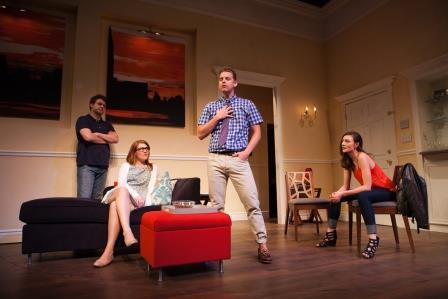
James Wagner, Lauren English, Patrick Russell and
Natalie Mitchell in Seminar (Photo by: Jessica Palopoli)
- Kate (Lauren English) is a young woman who, thanks to her family's long-term residency in a rent-controlled apartment with nine rooms on Manhattan's Upper West Side (with a monthly rent of only $800), doesn't have to worry about cash flow. An extremely insecure woman who keeps trying to polish the one story she has written in six years ("People said they liked it"), Kate quickly seeks solace in potato chips, ice cream, and other comfort foods as a means of coping with rejection. A graduate of Bennington College who probably had to cope with a fair share of mean girls on campus, she has her own way of standing up for herself.
- Martin (James Wagner) is the most talented writer in the group. Although he has churned out hundreds (perhaps even thousands) of pages of text, he has spent his last dime on the tuition for this seminar. Desperate for editorial help, he is too insecure to let anyone look at his work. Having been kicked out of his former living situation, he has asked Kate to let him crash at her apartment throughout the 10-week course of the seminar.
- Douglas (Patrick Russell) is a smug young man who, having been accepted at such prestigious writing retreats as Yaddo and the MacDowell Colony, has become a pretentious buffoon. Having boosted his writing career through a variety of family contacts (his uncle is a famous playwright) and his own networking skills, Douglas has become a cartoonish representation of the theory that getting ahead depends on who you know (or who you blow).
- Izzy (Natalie Mitchell) has long shown talent as a writer. Terrified of rejection but confident in her ability to handle a man's sexual interest, she ends up being the first person in the group to sleep with the professor.
- Leonard (Charles Shaw Robinson) is the merciless, acid-tongued editor leading the seminar. In his early days as a writer, he was accused of plagiarism. Leonard eventually built a secondary career as a talented editor who is quick to shatter the illusions of aspiring writers. Midway through the play he leaves New York for a quick trip to cover a story in Somalia for a magazine assignment.
Charles Shaw Robinson (Leonard) and James Wagner
(Martin) in Seminar (Photo by: Jessica Palopoli)
As always, Rebeck is masterful in crafting sharp intellectual putdowns and letting her characters expose their weaknesses. While I am a great admirer of her writing, Seminar, alas, is not Rebeck's strongest work. Two things, in particular, rang false during the evening.
- Leonard's snap judgments about his students' work were usually delivered after he had quickly scanned barely half a page of their writing. It's a great visual gag, but hardly reflective of an editor who is going to spend 10 weeks evaluating the work of only four students.
- The sounds used to signify breaks between scenes belong to those of an old manual typewriter. With Rebeck's script set in the present, I'd be willing to bet that Leonard is the only character who ever heard that sound (all of his students are doubtless writing on computers).
Working on Bill English's stylish rotating set, Glazer's direction scores strongest in the play's final scene, when a distressed Martin goes to Leonard's apartment in a futile attempt to get a partial refund of his tuition (only to discover that Kate has dumped him and is now shacking up with her professor). The confrontation between the three over writing talent, sexual fidelity, and unrealistic expectations provides a suitable, if somewhat unpredictable climax for the audience.
Charles Shaw Robinson, Lauren English, and James Wagner
in Seminar (Photo by: Jessica Palopoli)
In his program note from the Artistic Director, Bill English states that:
"Writing is supposedly one of our most civilized attributes. And yet what the initiates in Rebeck's Seminar learn is that words must be scalpels that we use to cut through the fat we build up around painful truths and primitive selves. The writer, like the actor, must be ruthlessly honest and fearless if anything of value is to come from our work. Seminar is a euphemism that quickly devolves into the competitive dog-eat-dog world where our human competitiveness is shown for what it can be at the worst: the survival of the fittest."
That being said, Rebeck's play takes place in a comfortable and remarkably unthreatening environment. By contrast, someone once described pure hell as "being stuck out of town with a new musical in Philadelphia." Here's the trailer:
To read more of George Heymont go to My Cultural Landscape

